The Northern Weekly Salvo
Incorporating Slaithwaite Review of Books, Weekly Notices, Sectional Appendices, Tunnel Gazers’ Gazette etc. Descendant of Teddy Ashton’s Northern Weekly and Th’Bowtun Loominary un Tum Fowt Telegraph
Published at 109 Harpers Lane Bolton BL1 6HU email: paul.salveson@myphone.coop
Publications website: www.lancashireloominary.co.uk
No. 306 September 19th 2022
Salveson’s half-nakedly political digest of railways, tripe and secessionist nonsense from Up North. Sometimes weekly, usually not; definitely Northern.
The King and I
The editorial team at The Salvo sends its hearty greetings to King Charles III and wishes him well as our new monarch. He’ll have a very hard act to follow. Even republicans should admit to an admiration for the late Queen and for the unifying role she has played over the 70 years of her reign, but particularly in the last twenty. I’m privileged to have met her, when I received my MBE back in 2008; I remember back then being hugely impressed by how hard she worked during what was a very long day. I’d single out her visit to Ireland in May 2011 as being a particularly brave and hugely positive act, which included going off her prepared script and saying a few words in Irish.

The visit was welcomed by Gerry Adams; a year later Martin McGuiness shook hands with Queen Elizabeth during her visit to Belfast. Alex Maskey, Northern Ireland Assembly speaker and Sinn Fein AM, twice interned during the 1970s, said recently: “Queen Elizabeth showed that a small but significant gesture – a visit, a handshake, crossing the street or saying a few words in Irish – can make a huge difference in changing attitudes and building relationship.”
If she was good enough for the Shinners, she’s good enough for me, not forgetting her carefully crafted approach towards Europe and Brexit. As for Charles – a decent man with a passion for the environment. I remember hearing him speak at an event in Clarence House many years ago and was stuck by his honesty and genuine concern over environmental issues. A bit of a rail crank too, which is no bad thing. Maybe we’ll get a new ‘King’ to add on to Collett’s mighty 4-6-0s. Those readers who are not great fans of monarchy should grit their teeth over the next few weeks and recognise the humanity of the late Queen Elizabeth and wish the new incumbent well; and let us hope that it will be an opportunity to move on from some of the more archaic trappings of royalty and bring it into the 21st century, following the example of the Netherlands and Spain but doing it in our own way. In the meantime, we have a new monarch who, unlike ‘his’ government, has a real concern over the number 1 issue facing not just our country, but the world – the effects of climate change.
Last Train from Blackstock Junction has now arrived
It’s out – my new book comprising 12 short stories about railway life in the North. Last Train from Blackstock Junction has a very kind foreword by Sir Peter Hendy, chairman of Network Rail, who said “As you read these stories, you’ll find some history, some romance, some politics, a little prejudice – sadly – and some humour; you will in fact be in the world of railway men and women. I hope you find them as absorbing as I did when I read Paul’s manuscript. Please enjoy his work!”
Writer and environmentalist Colin Speakman said “it is an amazing collection – powerful, moving, and what I would call ‘faction’ which tells truths even though the details may be fantasy, ‘Hillary Mantel school of history’ perhaps. 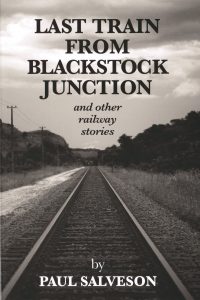 Director of Platform 5 Publishing, Andrew Dyson, said “Paul’s stories provide a fascinating insight into what life was really like for thousands of railway workers.”
Director of Platform 5 Publishing, Andrew Dyson, said “Paul’s stories provide a fascinating insight into what life was really like for thousands of railway workers.”
The tales include a ghost story set in a lonely signalbox in Bolton on Christmas Eve 1910. Some Salvo readers may remember it from Christmas’s past. There’s a new spooky tale set on the Furness Line. Other stories are about life on today’s railway, including ‘From Marxist to Managing Director’ – the story of a young female political activist who ends up running a train company. Some are set in the ‘age of steam’ and life on the footplate as well as the rise of the trades unions on the railways and the rise of the Labour movement. The title story, ‘Last Train from Blackstock Junction’, is set at the time of the Beeching cuts in the 60s and is about the attempts of a group of young boys (no names mentioned) to save their local station.
Salvo readers will get the book at a specially discounted price, courtesy of Platform 5 Publishing. Go to https://www.platform5.com/Catalogue/New-Titles. Enter LAST22 in the promotional code box at the basket and this will reduce the unit price from £12.95 to £10.95.
Three launches have been planned; the first, at Elsecar Heritage Centre, was last week. The next is at the Platform 5 Gallery, Bolton Station, on Wednesday September 21st at 18.00h. That’s followed on Wednesday September 28th at Carnforth Station Heritage Centre from 14.30h. The event is kindly hosted by Furness Line Action Group (FLAG). Salvo readers are very welcome to both but let me know if you’re coming. I’m happy to give talks about the book and its stories to other groups, by arrangement.
Are you proper Lancashire?
I’m in the middle of writing a book about Lancashire history, culture and identity. It will be called Lancastrians: Mills, Mines and Minarets and will be published by Hurst next year (see www.hurst.com). It covers a vast range of subjects including work, play, housing and health, education, art and literature, music, religion and politics. It includes the

Lancashire émigrés (to Russia, America, Australia etc.) and also the ‘new Lancastrians’ who have settled here in the last 250 years. By ‘Lancashire’ I mean the historic county, pre-1974 boundary changes. I have a concluding chapter looking at the future of Lancashire and whether the idea of a ‘Lancashire identity’ remains strong, including in places that were ‘taken out’ in 1974: Greater Manchester, Merseyside and ‘Lancashire north of the sands’. I want to get a feel for what people living in Lancashire (or those who have left) think about Lancashire identity. I’ve devised a short questionnaire which you can download from my website – please give it a go and try and get it back to me by the beginning of next week. It’s here:
Has ‘Levelling-Up’ been flattened? Regions need real power, not favours
There are growing concerns ‘up North’ that the Government’s ‘Levelling-Up’ agenda will be abandoned, following Liz Truss’s victory in the Tory leadership contest (not that Sunak would have been any better). Several Northern newspapers published a joint statement last month addressed to Truss and Sunak calling them to commit themselves to continuing with the policy, which has seen some new investment going into projects ‘north of Watford’. They asked:
- What will you do to make sure the commitments made to the North by your predecessors as prime minister are kept?
- The average worker in the North is 50 per cent less productive than one in London, what will you do to address this widening gap?
- What will you do to address spiralling rates of child poverty in parts of Northern England?
- How far will you go to give Northern leaders control over education and skills, transport and health budgets currently held by Westminster, and will you give them more powers to raise or lower taxes to boost local economies?
- Will you retain a government department responsible for tackling regional inequalities with a Cabinet-level Minister for whom this is their main job?
The two contenders responded quickly and reassuringly. How could they not do? Yet the questions reflect growing unease across the North
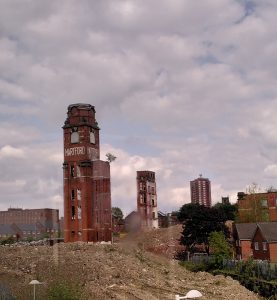
among business leaders, local authorities and even Tory MPs that the ‘levelling-up’ agenda was going to be a casualty of the leadership change. Things were not helped by Michael Gove having ministerial responsibility for ‘levelling-up’. For some reason, nobody seems to like him. Maybe I was a partial exception; he had a brain, and little wonder that he had no expectation of getting a job in Truss’s cabinet.
In a recent Guardian article John Harris highlighted the new Government’s disinterest in ‘levelling-up’, with the new PM not mentioning the term once in her first speech outside 10 Downing Street. The hopes, maybe not high ones, that many Northern local authorities had about getting a bit more out of central government following the loss of EU support, looks like being dashed. Instead, we have a PM whose priority is tax cuts and removing the cap on bankers’ bonuses. Oh yes, and taking on the unions with further restrictions on the right to strike.
What all this demonstrates is how ‘regional re-balancing’ will never work if it is just about top-down largesse from central government that can be given, and just as quickly taken away, on a political whim. Truss said during the leadership election campaign that she wanted to see more powers devolved to cities and communities. But what is she planning to devolve to? In England we do not have functioning regional government. What we have got is a half-baked system of mayoral authorities in which one person is elected, with precious little accountability. This contrasts with Scotland, Wales and Northern Ireland which have well-established devolved governments elected by PR. Until the English regions have something like this, devolution is meaningless.
Clearly, there are big opportunities for Labour here. Party conference is in Liverpool next week and the groundswell for a clear commitment to voting reform is very strong. As the party edges closer to an accommodation with the Liberal Democrats, who traditionally have been far more open to democratic devolution than Labour, perhaps there is a possibility that change might be on the agenda. I’m not holding my breath. If Starmer thinks that all he needs to do is hand a bit more money and power to Andy Burnham and other city mayors, he is much mistaken. What is needed is a much more deep-seated shift from our centralised state and an under-funded mish-mash that is local government to a new regionalism that can work with empowered local government. It needs new regional assemblies that build on the city regions but take in a wider area, with members elected on a proportional system. If we took Greater Manchester as an example, it could extend northwards to include Lancashire and west to Warrington. Call it ‘Lancastria’ – regionalism should reflect people’s historic identities rather than a planners’ idea of what works. A region the size of ‘Lancastria’ makes sense in terms of a viable regional economy and a sustainable transport network.
A Lancashire beauty spot
A few Salvo readers from the Rochdale area will need no lectures from a Boltonian about the beauties of Healy Dell. But some from further afield may not be familiar with this most beautiful of spots, of great interest to the railway historian, art lover, foodie and walker. The towering glory of Healey Dell is the viaduct, on the former Rochdale –  Bacup Line which closed to passengers in 1947 and to freight in 1967 (though the line beyond Whitworth had shut completely in 1963). The Locomotive Club of Great Britain ran a special train in April 1967 comprising four guards’ brake vans hauled by L&Y ‘Pug’ 51218 – which is still very much alive and well.
Bacup Line which closed to passengers in 1947 and to freight in 1967 (though the line beyond Whitworth had shut completely in 1963). The Locomotive Club of Great Britain ran a special train in April 1967 comprising four guards’ brake vans hauled by L&Y ‘Pug’ 51218 – which is still very much alive and well.

The special ran as far as Whitworth, doing three round trips. There are some delightful walks through the Dell, allowing you to admire the viaduct from below; you can also walk and cycle over it. In the valley bottom, by Spodden Brook, are the remains of Th’Owd Mill i’th’Thrutch. There’s also the Fairy Grotto which we visited on Sunday; being a bank holiday weekend the fairies were not around.
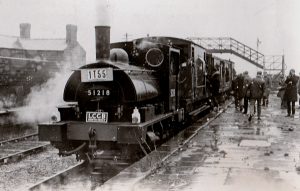
If you carry on along the narrow lane you reach a group of buildings, some of which are derelict but others are put to very good use. Some slightly ramshackle buildings are home to Phyllis Hargreaves’ studio; she is a very talented artist with a great love for the area. Almost next door is Healey Dell Heritage Centre and Tea Rooms. The buildings were the former mill offices and have been very well restored. A welcome addition is an outside conservatory which overlooks the brook. The young staff are very pleasant and helpful and I look forward to going back to try the home-made meat and potato pie (with mushy peas and red cabbage). If the scones are anything to go by, it should be a most tasty dish.
Manchester’s ‘Thinking Club’ – worth a thought
Here’s an idea that could work wherever freedom of speech is under attack – Hong Kong, Russia, China…..In 1796 a group of radicals came together to form ‘The Manchester Thinking Club’. Historian William Axon quoted from a contemporary newspaper account:
On Monday evening (28th December 1796), the members of The Manchester Thinking Club commenced their first mental operation by beginning to think, or in other words, submitting themselves like a good subjects to a constitutional numbness. The number of thinkers

was not less than 300, and many of the thoughtful actually came from Liverpool, Stockport, and other remote places to witness this novel spectacle. The members were all muzzled, and such an imposing silence prevailed for one hour as would have done honour to the best thinks that ever adorned assemblies of a more dignified nature….the word ‘Mum’ appeared in large characters on every muzzle..
The article went on to inform readers that “the members of this truly constitutional society continue to meet for the intellectual purpose of silent contemplation every Thursday evening, at the Coopers Arms, Cateaton Street, where strong constitutional muzzles are provided at the door by Citizen Avery, a tailor to the swinish multitude.”

The ‘Thinking Club’ was a clever piece of political theatre, poking fun at repression and intolerance. What became of the club is not recorded, but many of its members would have coalesced into the networks, mostly operating in the shadows of legality, which developed into the great reform movements of the 1820s and 1830s.
Talks, walks and wanderings
Following the ‘official’ end of the Pandemic, I’ve been getting a number of invitations to give talks on various topics. Recent talks have included ‘Allen Clarke’s Bolton’ for Friends of Smithills Hall and Bolton U3A, ‘Railways and Railwaymen of Turton’ for Turton LHS, ‘Moorlands, Memories and Reflections’ for What’s Your Story, Chorley? and ‘Railways and Communities: Blackrod and Horwich’, for Blackrod LHS. On October 4th I’m talking about ‘The Social History of Lancashire’s Railways in Preston and ‘Railways in the North’ for the Stephenson Locomotive Society in Manchester on November 5th. The following Saturday I’m at Shap Wells talking to the Cumbrian Railway Association on the Settle-Carlisle Railway. Other topics are:
- The Lancashire Dialect Writing tradition
- The Railways of the North: yesterday, today and tomorrow
- Allen Clarke (1863-1935) Lancashire’s Romantic Radical
- The Winter Hill Mass Trespass of 1896
- The Rise of Socialism and Co-operation in the North
- The Clarion Cycling Clubs and their Club Houses
- Walt Whitman and his Lancashire Friends
- Forgotten Railways of Lancashire
- Banishing Beeching: The Community Rail Movement
- Railways, Railwaymen and Literature
I charge fees that are affordable to the organisation concerned, to fit their budget – so by negotiation. My preferred geographical location is within 25 miles of Bolton, ideally by train/bus or bike. With sufficient notice I can go further afield.
Railway Reform: re-inventing the station booking office
My piece on station booking offices in the last Salvo (and in RAIL 364) generally got a good response, though I was accused by some readers of being ‘anti-union’. I’m not – and have supported trade unionism all my life. The proposals for developing booking offices (or station shops) would increase the number of jobs available and hopefully those new employees would see the benefits of joining a union. However,
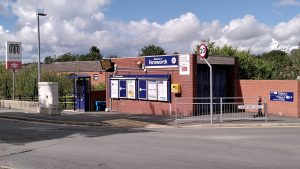
things cannot stay as they are – the choice is between the axe falling on dozens booking offices with staff being displaced or made redundant, or re-inventing what the role of the traditional booking office is. In some cases there may be scope for new, staffed, facilities at some stations based on social enterprises running new businesses which might include ticket sales. The Rail Reform Group is planning to organise a seminar looking at new ideas for station booking offices; look out for further details. Meanwhile, I had a very good crop of readers’ letters on the subject, particularly the successful Swiss experience. See below:
READERS’ LETTERS:
regarding railway booking offices
Malcolm Bulpitt writes: “Some 15 years ago Swiss Federal Railways, together with a food retailer, set up a company called AVEC and began converting many of their remaining station ticket offices to small convenience stores that also sold (very efficiently in my experience) the whole range of rail/travel tickets. These have proved to be a great success, to the extent that their take away coffee and food offerings have seen the demise of on-train catering trollies. For the traveller, you win some, you lose some!
“Philip Lockwood echoes Malcolm’s points: “Paul I found your comments regarding booking offices with possible additional uses very interesting. To quote a small station in Filisur Switzerland on the Rhb. This station used to have a manned booking office but now has a ticket machine. The difference now is that it also has a small coffee shop with the option of take away food. Good for people who don’t want to use the ticket machine the staff will also sell you tickets for rail use. This is proving very popular not only with travellers but also a nice place for a chat and enjoy a coffee.”
Vince Chadwick adds: “Yes, all stations need a station cat. Regarding booking offices, I tried to buy tickets for my wife and I to travel Wilmslow to Truro via Newport, Wales, as that is the cheapest route by far. I found what I wanted on the National Rail website and hit the ‘buy now’ button, whereupon it decanted me to the TfW site to buy the tickets. But it had not given the TfW site any information about my journey, so I had to start from scratch to find the required tickets on that site. There was no sign of them. There were plenty of tickets at much higher prices than the NR site had given me, however. At this point I went down to Wilmslow station booking office and within a few minutes had purchased the tickets I wanted at the price shown on the NR site.
I’m not citing this as an argument for retaining station booking offices, but as an argument for simpler rail ticketing and – most importantly – supported by a simple and robust ‘one shot’ (not chucking you over the fence to another web site to start again) on-line system for booking and purchasing tickets.”
A senior chap in DfT commented: “As ever Paul, found this a great read and further insight into some of the possibilities for alternative lenses to see problems through. Liked the piece on booking offices and will think about this. Also agreed very much with the letter from Cynthia Dereli. The railways should be a treated economically as not just a ‘public good’ but ‘an economic good’.”
New Projects
Much of my time this year will be devoted to work on one of my biggest projects – a cultural and social history of Lancashire. Lancastrians will be published by Hurst (who recently brought out the fascinating Northumbrians) next year. See above.
Still in Print (at special prices!)
ALLEN CLARKE: Lancashire’s Romantic Radical £9.99 (normally £18.99)
Moorlands, Memories and Reflections £15.00 (£21.00)
The Works (novel set in Horwich Loco Works) £6 (£12.99)
With Walt Whitman in Bolton £6 (9.99)
See www.lancashireloominary.co.uk for full details of the books (ignore the prices shown and use the above – add total of £4 per order for post and packing in UK)
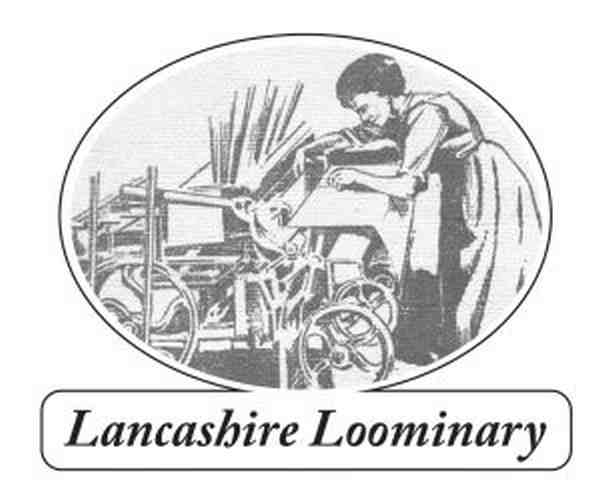
7 replies on “Northern Weekly Salvo 306”
Hia Paul I agree with your comments about the Queen. I watched with mum and we were admiring the flowers on the coffin … later learned that they are all from the palace/ castle gardens including rosemary for remembrance and oak for strength.
No plastic. King Charles insisted.
Paul
One problem with using a station booking office as a convenience shop is that it will probably take trade away from existing local stores, which are having a hard enough time as it is. Also, the (often listed) station buildings may be unsuited to fitting out with, say, freezer/chiller cabinets.
However there is line of business which requires a very similar staff skill set and facilities to a ticket office, namely a post office. Moreover following years of ill-thought-out cutbacks enforced by Post Office Counters Ltd, many towns are now very badly served. By way of example, Bradford on Avon (pop 10000, or 15000 with adjacent villages) has just one postal counter, in the local co-op, which is totally inadequate in terms of both space and staffing. Combining rail and postal facilities could be a win-win.
The inability to acknowledge anyone as my “better” simply by birthright means I am a republican by implication, I would shake hands with the monarch as an equal, but that is as far as it goes. I wish the “Empire” awards could be changed to remove that imperial connotation, which is a subtle slap in the face for those recipients whose heritage is in one of the former colonies. It is a matter of personal conscience like so many things. The only saving grace of a constitutional monarchy is that we will never end up with Boris Johnson as president!
Predictive text strikes again, it should read inclination!
What I failed to mention in my previous comment about the Swiss experience of converting Booking Offices to convenience stores, coffee outlets, etc. was that the displaced railway employees were always given the first option to become involved the new business either as part owners or salaried operators. Apparently the SBB also offered low cost loans to encourage their former staff to become local entrepreneurs.
[…] Here’s the latest Salvo, published online a few days ago. It features thoughts on the monarchy and the new king, levelling-up, or down, and a fascinating piece on a radical imitative of the 1790s – The Manchester Thinking Club. It’s here: http://lancashireloominary.co.uk/index.html/northern-weekly-salvo-306 […]
Writing from not very sunny Devon to say keep up the good work, Paul. I agree with your comments about the monarchy. I had a wave from the then Prince Charles from the footplate of Britannia a few years ago so you must be right about his railway interest, and he also plays the cello!
Interesting comments about ticket offices and let’s hope some of the ideas appeal to the rail industry and DfT.